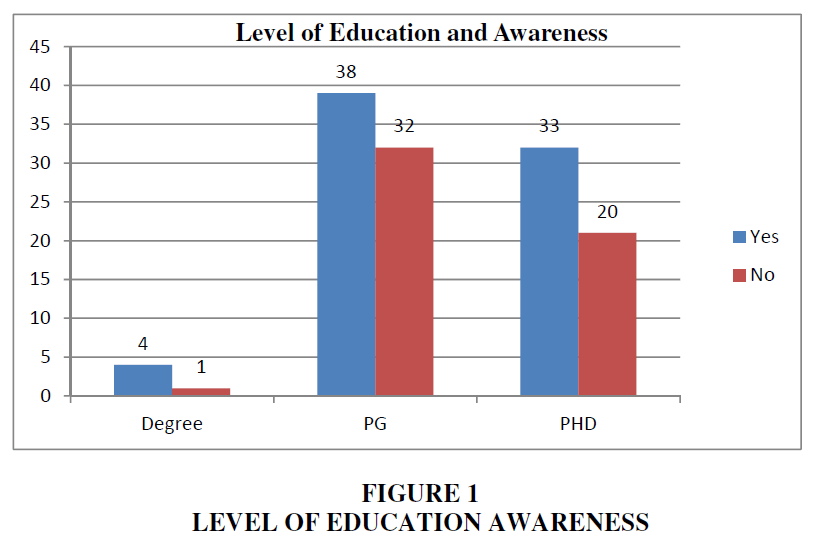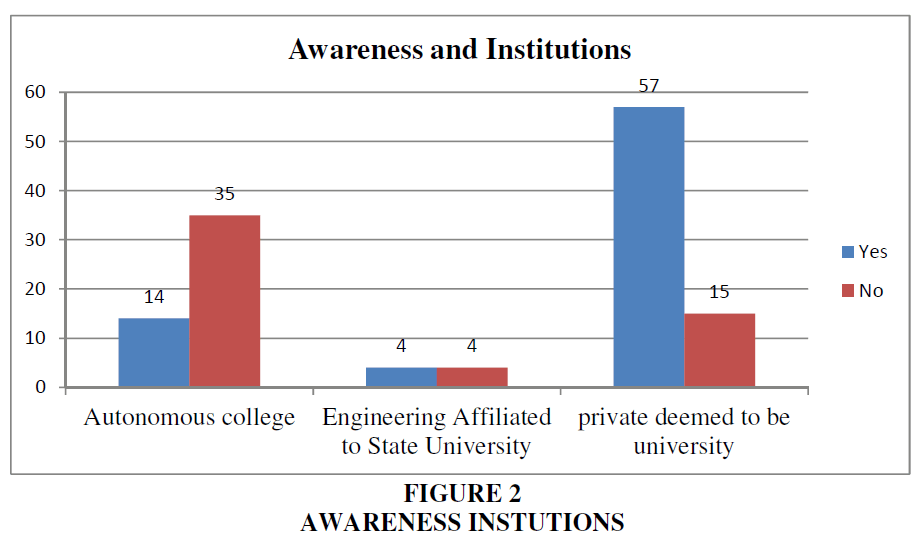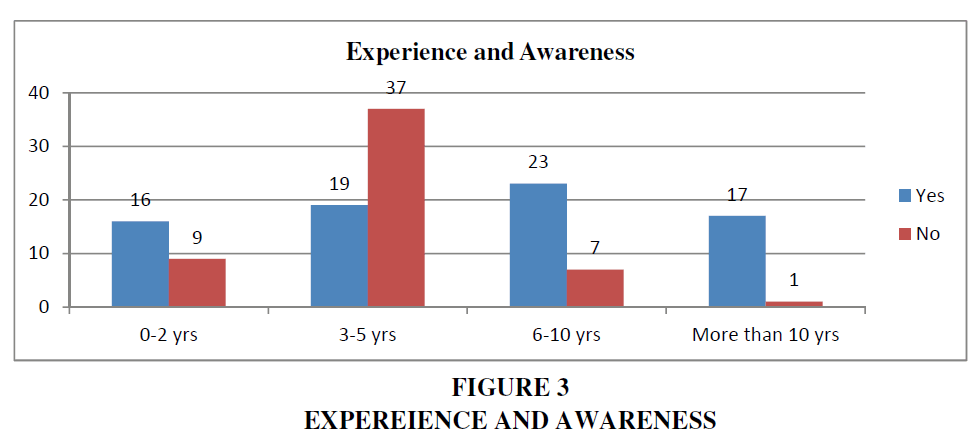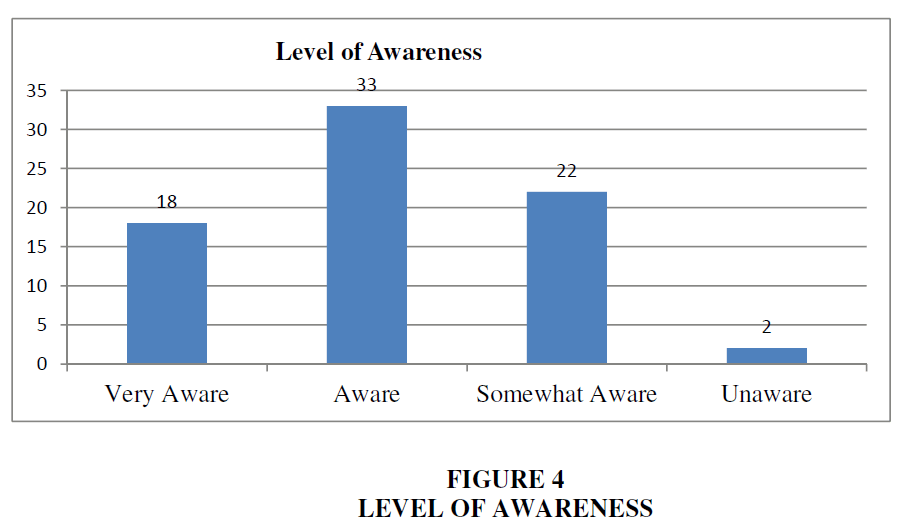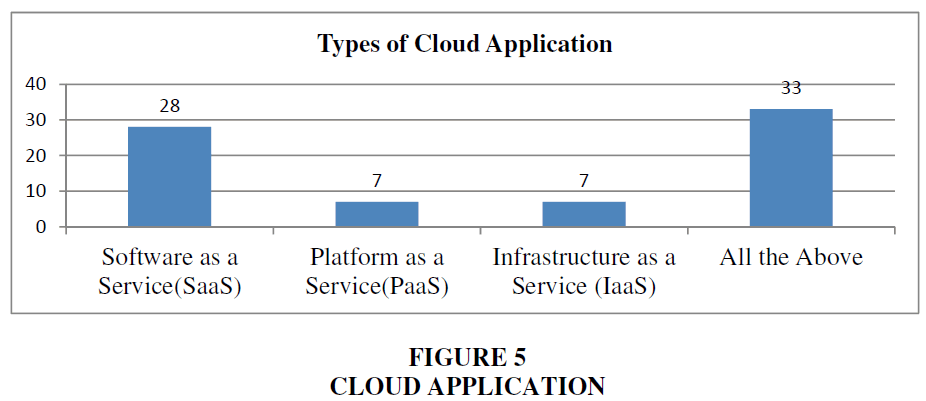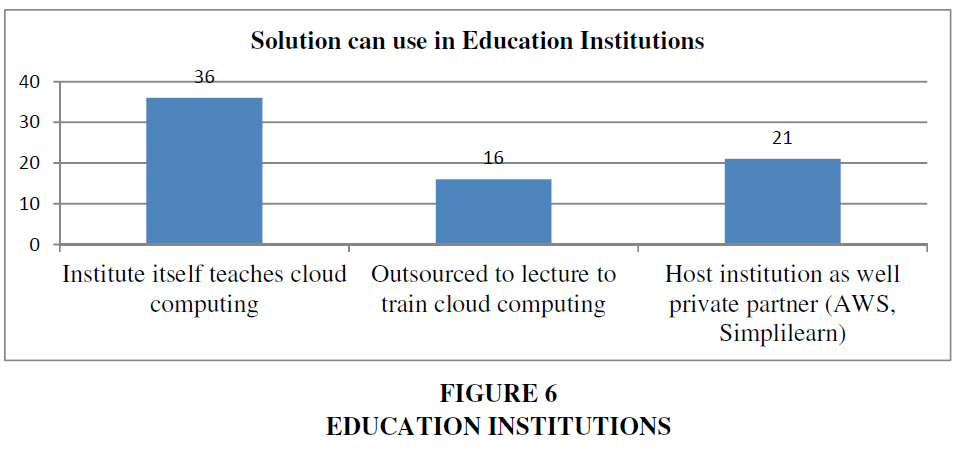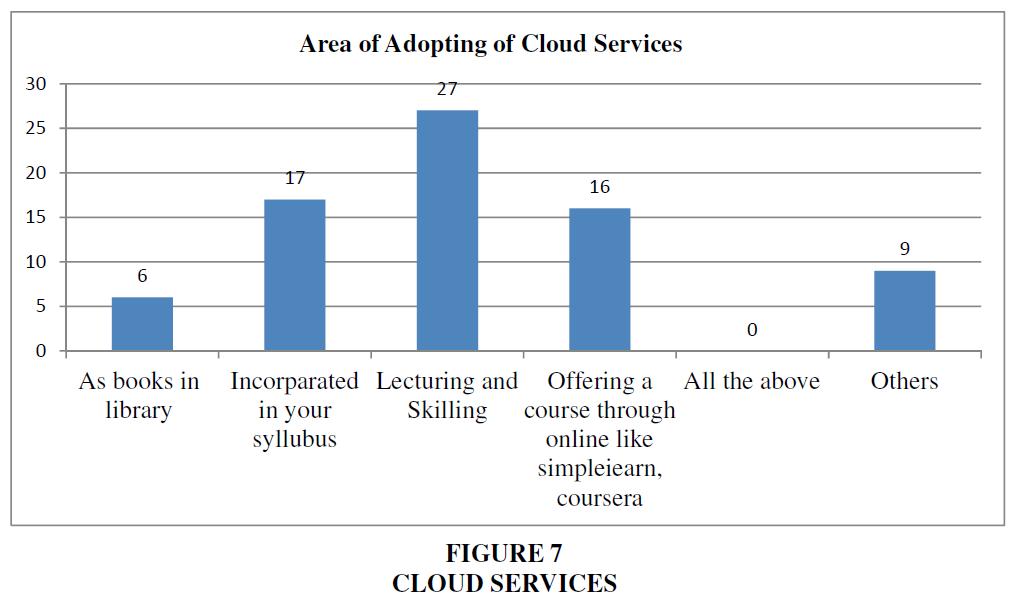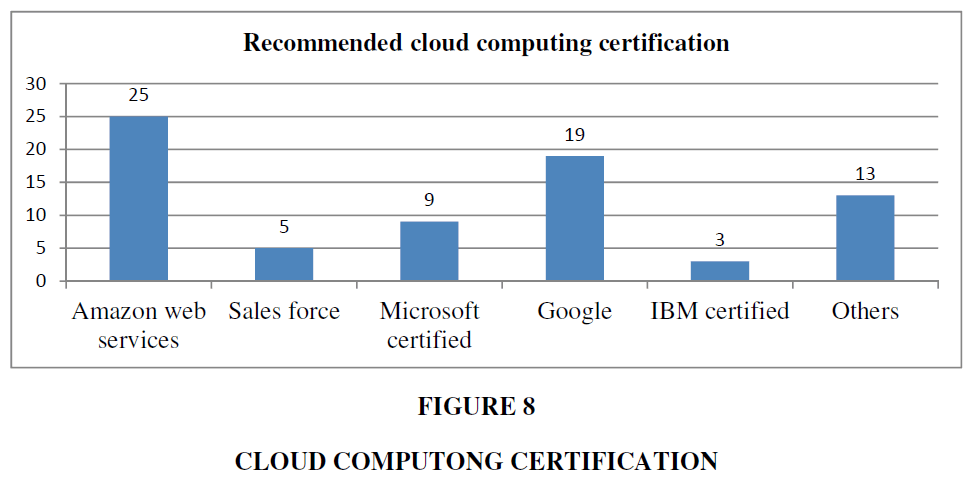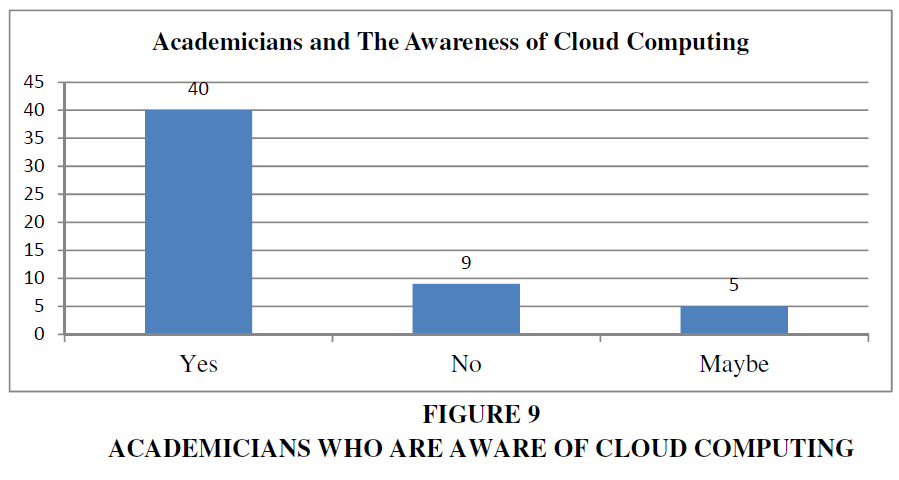Review Article: 2022 Vol: 26 Issue: 4
A Study on the Awareness of Academic Practitioners In Cloud Computing Concerning the Institutes offering Technical Education
Anusha K., Koneru Lakshmaiah Education Foundation
Anil Kumar G, PVP Siddhartha Institute of Technolgy
Jhansi Lakshmi Kesari, Koneru Lakshmaiah Education Foundation
Leela Sesha Sairam Satram, Koneru Lakshmaiah Education Foundation
Citation Information: Anusha, K., Anil Kumar, G., Lakshimi, K.J., & Sairam Satram, L.S. (2022) A study on the awareness of academic practitioners in cloud computing concerning the institutes offering technical education. Academy of Marketing Studies Journal, 26(4), 1-12.
Abstract
‘Cloud Computing awareness and adoption is the need of the hour, to meet the current market demands and expectations in terms of quality of education and the competition that market is currently facing, it has become crucial to use technology to the best of its ability to be the bare minimum to land a safe and comfortable jobs that the business atmosphere in and around our country is looking forward to. Either be it a boon or a bane, this is being penetrated to a level that companies like BYJUS, white Hat Jr,, and many more Ed-Tech companies have started programs to preschoolers such as coding, game designing, making them understand the basics of UI/UX aspects. This is very much similar to the 2000-2008 fame waves that competitive exams and colleges like IIT’s and other elite colleges have seen. So it is suggested and insisted to make our working force of the education industry make them well aware of these aspects and prepare them future ready.Objective: To understand the level of awareness on cloud computing among academic practitioners in the Vijayawada and Guntur districts and to determine the level of awareness on the emerging technology. Methodology: A structured questionnaire and survey approach are used to perform the methodological research. Findings: The research identifies that a more collaborative training (train the trainers) is required for the cloud computing technologies among the teaching fraternity. The institutions have incorporated it in their syllabus as professional elective but the awareness and skilling among the practitioners has to be drawn.
Keywords
Cloud Computing; Awareness; Academic Practitioners.
Introduction
Educational institutions are effective in the virtual release of high- grade educational favors to address the current obstacles given by COVID-19. The preceptors can employ cloud computing to ameliorate the tutoring experience and productivity. Cloud computing has tremendous implicit since it allows stakeholders to use the same structure for tutoring, literacy, and exploration at the same time, saving both plutocrat and energy (Somya Agrawal, 2020). Grades and numerals are important in the traditional Indian educational framework. In a competitive atmosphere, on the other hand, practical knowledge, experience, and analytical thinking are necessary. In schools, colleges, and even universities, the modern educational system has failed to provide. Thanks to new techniques, it is now possible to demonstrate things practically through presentations and animations, making it easier to visualize things. One of the most notable breakthroughs of this period is cloud computing. The technology allows education to reach people in far-flung regions. Cloud computing has the implicit to aid in the development of a high- quality educational system (NitikaGoyala, 2017) Cloud computing is a new trend in the field of information technology. The study is to determine the awareness among academic practitioners concerning the Institutes offering technical education. To achieve the study's goal, an exploratory study using one approach, including a quantitative (survey), is conducted to assess the technology in academics.
Cloud computing refers to the use of cutting- edge technology in the tutoring and literacy process. In higher education and exploration associations, cloud computing is employed for exploration and tutoring. This grassed the experimenters’ decision to research the position of mindfulness of academic interpreters in cloud computing concerning the Institutes offering specialized education. The study's objects are divided into three orders. First, it investigates the position of cloud computing mindfulness among academicians in the Vijayawada and Guntur sections. Second, it investigates the level of awareness among academic practitioners, as well as the types of benefits that scholars can gain and employment opportunities. Also it investigates whether they want to be apprehensive of cloud computing technology or not. The findings of the study would add to the existing literature and exploration on cloud computing awareness in the environment of an educational setting. Because academicians are highly regarded as people in the fields of tutoring and research in a country, their knowledge on cloud computing would enhance university instruction and arouse the administration's interest in prioritizing this technology.
Review of Literature
Cloud computing operations in education are used specifically in virtualization-Learning, and also in cloud development models. Education is ensuring economic growth. The industries are updating in cloud computing through the internet because of the availability of virtualized resources. Many learning institutions are using cloud-based applications to provide economic and business-related work beneficial to the students and other users. Cloud computing is exponentially growing among academic institutions (Nishant Katiyar, Dr. Rakesh Bhujade 2018). The primary purpose of the study is to find out how important academic staff at Sri Lankan universities are understanding cloud computing and how accepting they're of it. The findings of the research give an essential indicator of how important technology is used by academicians in Sri Lanka (Irshad,M.B.M 2017). Academic libraries in Africa have a poor acceptance rate for cloud computing, according to the study's findings. Academic libraries' adoption of cloud computing has been hampered by a want of institutional course guidelines and authentication courses from cloud favor providers (Yaw et.al, 2019).Education sector converted to be in online very recent times due to the pandemic that occurred recently where every country has been affected. Due to the covid-19 pandemic, teaching has been through the virtual meet. In the situation, cloud computing helps to change teaching and productivity techniques. Cloud computing not simply saves cost but similarly command due to the high operation of structure for the operation of tutoring- literacy and exploration by some stakeholders. Cloud picture, gamification, and cooperative E-learning technologies are a many operations of cloud computing (Somya, 2020). The study was to figure out where Turkish institutions stand in terms of cloud computing and to offer an ideal cross cloud frame for them. The issues of the study were statistically examined under the headlines of" Awareness,"" Demand,""Cloud Services/ Applications," "Technology Readiness, “and" advantages and Potential Obstacles" (Hakan 2021). Cloud computing technology discovered to be employed by libraries in the institutions surveyed, with resource cost- effectiveness and file-sharing being two of the vital advantages of librarians applying cloud computing technologies. Still, protection and separateness, as well as numerous taxation, have been recognized as important drawbacks to librarians' use of cloud computing in carrying out their duties in libraries. (Lazarus C. Njoku, 2021). From both an academic and a technological standpoint, the research explores the primary factors that influence cloud computing adoption at universities in elaborating countries. Educational specialists and specialized professionals both explosively encourage the employment of cloud computing in educative institutes in elaborating nations (M. Odeh et.al, 2017). The experimenters looked into the position of cloud computing mindfulness and operation among educational personnel in colleges of teaching in this study. The respondents had concerns about data security, internet unreliability and cost, and lack of trust in cloud service providers, according to the report. To enhance the use and knowledge of cloud computing among educational personnel, it existed suggested, among different effects, that educational personnel begin to get how to use cloud computing apps so that they can know the advantages that cloud computing may extend to exploration and tutoring operations (Mohammed A. Jibrin et.al 2019). The extent of this composition is Software as a Service model. This is the rent of computing finances on a net of outside waiters where operations are dash and data is kept. According, to the findings the scholars" sometimes" claim and apply cloud operations/ favors/ services, denoting that they aren't eventually prepared for a" shift to the cloud."To make them aware of the benefits of cloud applications and services, it is necessary to educate and motivate them (E. KreljaKurelović et.al, 2013).
Objectives
The study's major goal is to find out how well academic practitioners in technical education in Guntur and Vijayawada are aware of cloud computing. To understand and determine the level of awareness academicians have towards cloud computing incorporation.
Scope of the Study
The research focused on whether or not academic institutions offer cloud computing technologies for educational purposes. There's presently low data accessible on the usage of cloud computing in Indian technical education institutes. A literature review on cloud computing was conducted for this aim. This study also used an online questionnaire at several universities, institutions, and colleges to determine the existing condition of cloud computing and its future potential in Indian technical education institutions.
Methodology
The descriptive study used online survey questionnaires to obtain data. There were three sections to the questionnaire. Part A comprised of questions about the demographic profiles of the respondents. Part B included questions about academic practitioners' familiarity with cloud computing services. Part C consisted of questions that challenged respondents who answered "NO" to the awareness question to describe cloud computing services and their plans to use them in the future.
The questionnaires were sent to 200 randomly selected academic practitioners. Academic practitioners are elected as the sampling is affected mainly in training in different institutions and universities.130 out of the 200 questionnaires were finished and restored, and they were applied for additional analysis Table 1.
| Table 1 Cloud Computing Courses | ||
| Name of the Institute | Cloud Computing offered as a course | |
| Yes | No | |
| Private Deemed to be university | ||
| KL Deemed to be University | Yes | |
| SRM-AP | Yes | |
| VIP-AP | Yes | |
| Vignan University | Yes | |
| Autonomous Institute | ||
| VR Siddhartha Engineering College | Yes | |
| PVP Siddhartha Institute of Technology | Yes | |
| Ramachandra College of Engineering | Yes | |
| SRK College | Yes | |
| State Universities | ||
| JNTUK | Yes | |
| Krishna University | Yes | |
| Acharya Nagarjuna University | Yes | |
Analysis
There is awareness among a considerable academicians, but this cannot be the total answer might be looking for because of the fact that there should be deep knowledge and not just awareness about it. The graph is about the level of awareness that the academicians are aware of in regards to cloud computing Figures 1-5.
At the Post Graduation Level and PhD qualified academicians responded yes with their awareness on cloud computing technology. Also many academicians qualified yet lack the awareness in cloud computing technologies too Table 2.
| Table 2 Awareness and Institutions | ||
| Institution you working in/Awareness | Yes | No |
| Autonomous college | 14 | 35 |
| Engineering Affiliated to State University | 4 | 4 |
| private deemed to be university | 57 | 15 |
The Private deemed to be universities are in the race to make their academic faculties aware on cloud computing. Yet, the training is required among the academicians to make them multi-dimensionally and make them future ready Figures 6-8; Table 3.
| Table 3 Academic Experience and Awareness | ||
| Academic Experience/Awareness | Yes | No |
| 0-2 yrs | 16 | 9 |
| 3-5 yrs | 19 | 37 |
| 6-10 yrs | 23 | 7 |
| More than 10 yrs | 17 | 1 |
Academicians with awareness were experienced and the one not aware of were with between 0-5 years of experience Table 4.
| Table 4 Level of Awareness | |
| If yes, Please rate the level of cloud computing services you know | Responses |
| Very Aware | 18 |
| Aware | 33 |
| Somewhat Aware | 22 |
| Unaware | 2 |
The awareness is high among the academicians. But the level is not that high so among the academicians it is important to conduct training on the basics and moderate levels of cloud computing to bring awareness among the known faculty too Table 5.
| Table 5 Type of Cloud Application | |
| If yes, Which type of cloud application you know the most | Responses |
| Software as a Service(SaaS) | 28 |
| Platform as a Service(PaaS) | 7 |
| Infrastructure as a Service (IaaS) | 7 |
| All the Above | 33 |
Saas- software as a service is a very easily understandable and booming market. With .com companies on the rise since in the Silicon Valley, this resolved many business processes and made them automated like Hubspot, Active Campaign etc. The One who were aware have known the types of cloud application Table 6.
| Table 6 Cloud Computing which Solution Can Use in Educational Institutions | |
| Which solution do you think that educational institutions can use? | Responses |
| Institute itself teaches cloud computing | 36 |
| Outsourced to lecture to train cloud computing | 16 |
| Host institution as well private partner (AWS, Simplilearn) | 21 |
Many private institutes are looking at institutes to teach themselves with cloud computing courses or programs instead of outsourcing as this may be cost effective or long-term plans but there is also willingness to outsource and to partner with institutions offering to gain the cutting edge to their students Table 7.
| Table 7 Area of Adopting Cloud Services in the Technical Education | |
| Area of adopting cloud services in the technical education | Responses |
| As books in library | 6 |
| Incorporated in your syllabus | 17 |
| Lecturing and Skilling | 27 |
| Offering a course through online like simplilearn, coursera | 16 |
| All the above | 0 |
| Others | 9 |
According to the table 8 academicians are looking forward to incorporate in syllabus, lecture and offer it through online towards the benefit of their student in gaining employment Table 9.
| Table 8 Cloud Computing Certifications Like to offer with the Students | |
| Which of the following certifications of cloud computing are the institutions recommending to offer with their students | Responses |
| Amazon web services | 25 |
| Sales force | 5 |
| Microsoft certified | 9 |
| 19 | |
| IBM certified | 3 |
| Others | 13 |
| Table 9 Willingness to Get the Awareness of Cloud Computing | |
| Do you want to get the awareness of cloud computing | Responses |
| Yes | 40 |
| No | 9 |
| Maybe | 5 |
AWS, next to AWS is Google the most suggested or preferred certification for cloud computing software that academicians are looking forward for their students to get certified in cloud computing for gaining employment Table 9.
The academicians who are aware of Cloud computing, have expressed that they are willing to make an effort to learn or get awareness of the benefits that these skills can provide them with time in their professional journey Figure 9.
Anova
Null Hypothesis 1: There is no significant difference among experience with respect to awareness level of cloud computing services.
Alternate hypothesis 1: There is significant difference among experience with respect to awareness level of cloud computing services. There is no significant difference among experience in teaching with respect to level of awareness towards cloud computing services.
Since p>0.05
Hence the null hypothesis is accepted at 5% level with respect to level of awaqreness towards cloud computing services.
Anova
Null Hypothesis 2: There is no significant difference among designation with respect to awareness level of cloud computing services.
Alternate hypothesis 2: There is significant difference among designation with respect to awareness level of cloud computing services. There is no significant difference among designation in teaching with respect to level of awareness towards cloud computing services. Since p>0.05 .Hence the null hypothesis is accepted at 5% level with respect to level of awareness towards cloud computing services.
Findings
The study's objective was to establish the position of cloud computing knowledge among academic practioners in the Krishna and Guntur districts, and it discovered that academicians are slow to adopt cloud computing services. The research investigated to see the level of awareness in the academicians who were aware on cloud computing. The findings found that 55 of the respondents were unfamiliar with cloud computing and that this lack of understanding inhibited academics from taking advantage of cloud computing potential benefits.
The majority of the participants are unaware with cloud computing, still, the one responded aware also want awareness. The academicians with experience indicated with no awareness in cloud computing. The academicians who were aware with only 18 respondents rating their level of expertise as very aware (high), 33 respondents are aware, and 22 respondents are somewhat aware. The study was important in determining which types of cloud applications they were most familiar with. Out of 76 responses, more people know about all three types of applications (SaaS, PaaS, and IaaS), whereas 28 people only know about Software as a Services (SaaS).
The majority of academicians believe that an institute to teach with cloud computing can benefit their students. Also, cloud computing adoption in institutions can happen with the support with lecturing and skilling, with the syllabus and offering with online courses such as Simplilearn and Coursera. The experience and qualification didn’t had any relationship with the awareness in clod computing.
Conclusion
The experience and the academic cadre an academician working with had no relationship with the cloud computing awareness among academic practitioners in the Vijayawada and Guntur districts. For institutions train the trainers to be implemented with new technologies to incorporate for the benefit of the students as the institutions are the hub for research. The findings revealed that 41% of respondents were unfamiliar with the technology and that this lack of knowledge prevented academics from making use of the benefits that cloud computing services may provide. The benefits of cloud computing technology can be realized if the technology is adopted and disseminated, as mentioned in the diffusion of innovation theory. As a result, more efforts should be made to educate both academic practitioners at Vijayawada and Guntur universities. Because the study is descriptive, more research is needed to better understand cloud computing awareness.
References
Atuase, D. (2019). Adoption of Cloud Computing by Academic Libraries for Research Data Protection.
Hakan Aydin (2021) .A Study of cloud computing adoption in universities as a guide to cloud migration. July –September 2021, SAGE Open, pg:1-14.
Irshad, M. B. M., Md. Gapar Md. Johar (2017). The Study on Awareness and Adoption of Cloud Computing by Academics in Sri Lankan Universities. International Journal of Advanced Research in Computer Science and Software Engineering Research Paper,6-10. ISSN: 2277 128X, Volume 7, Issue 5, May 2017.
Kurelović, E. K., Rako, S., & Tomljanović, J. (2013, May). Cloud computing in education and student's needs. In 2013 36th International Convention on Information and Communication Technology, Electronics and Microelectronics (MIPRO) (pp. 726-731). IEEE.
Mohammed, A.J. (2019). Level of awareness and usage of cloud computing among academic staff in nigeria. International Journal of Information System and Engineering. 7(1), DOI:
Nishant Katiyar, Dr. Rakesh Bhujade, (2018). Framework to Cloud Computing Based M-Learning for Higher Education: An Adopt International Journal of Engineering Trends and Technology, 61(1), 40-48.
Nitika, G., Deepam, G. (2016).” Cloud computing in educational research”. In International Journal of Recent Engineering Research and Development 5(1).
Njoku, L. C., & Ken-Agbiriogu, E. (2021). Awareness and Use of Cloud Computing: Its Implications in Selected Academic Libraries in Imo State, Nigeria. Information Impact: Journal of Information and Knowledge Management, 12(1), 62-75.
Indexed at, Google Scholar, Cross Ref
Odeh, M., Garcia-Perez, A., & Warwick, K. (2017). “Cloud Computing Adoption at Higher Education Institutions in Developing Countries: A Qualitative Investigation of Main Enablers and Barriers”. In International Journal of Information and Education Technology, pg:921-927. Vol. 7, No. 12, December 2017.
Indexed at, Google Scholar, Cross Ref
Palos-Sanchez, P. R., Arenas-Marquez, F. J., & Aguayo-Camacho, M. (2017). Cloud computing (SaaS) adoption as a strategic technology: Results of an empirical study. Mobile Information Systems, 2017.
Indexed at, Google Scholar, Cross Ref
Rashid, N., Zeshan, A., Zeeshan, A., Noor, Nabi Shaikh., Asif, A.L., & Kumlesh, K. (2020). Cloud Computing Applications: A Review. EAI Endorsed Transactions on Cloud Systems, Received on 31 March 2020, accepted on 20 May 2020, 6(17).
Indexed at, Google Scholar, Cross Ref
Samyan, N. & St Flour, P.O. (2021). The impact of cloud computing on e-Learning during COVID-19 pandemic. International Journal of Studies in Education and Science (IJSES), 2(2), 146-172. retrieved in
Somya, A (2021). A Survey on Recent Applications of Cloud Computing in Education: COVID-19 Perspective. In IOP Publishing Journal of Physics: Conference Series, pg:1-8.
Indexed at, Google Scholar, Cross Ref
Received: 10-May-2022, Manuscript No. AMSJ-22-11945; Editor assigned: 11-May-2022, PreQC No. AMSJ-22-11945(PQ); Reviewed: 25-May-2022, QC No. AMSJ-22-11945; Revised: 27-May-2022, Manuscript No. AMSJ-22-11945(R); Published: 30-May-2022
